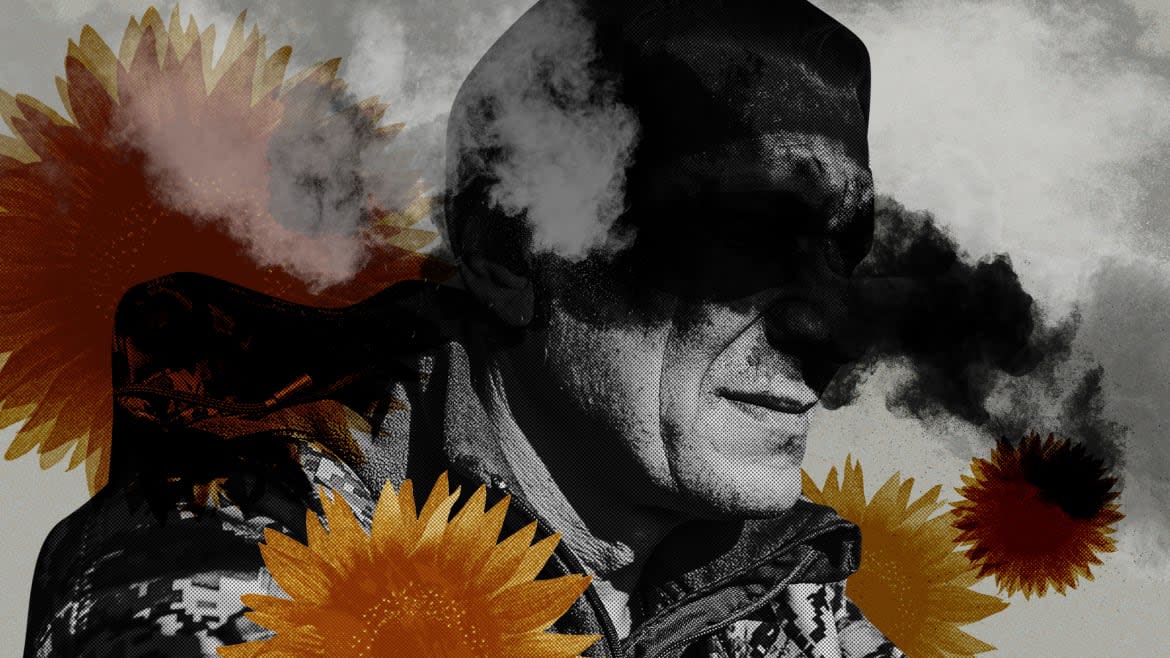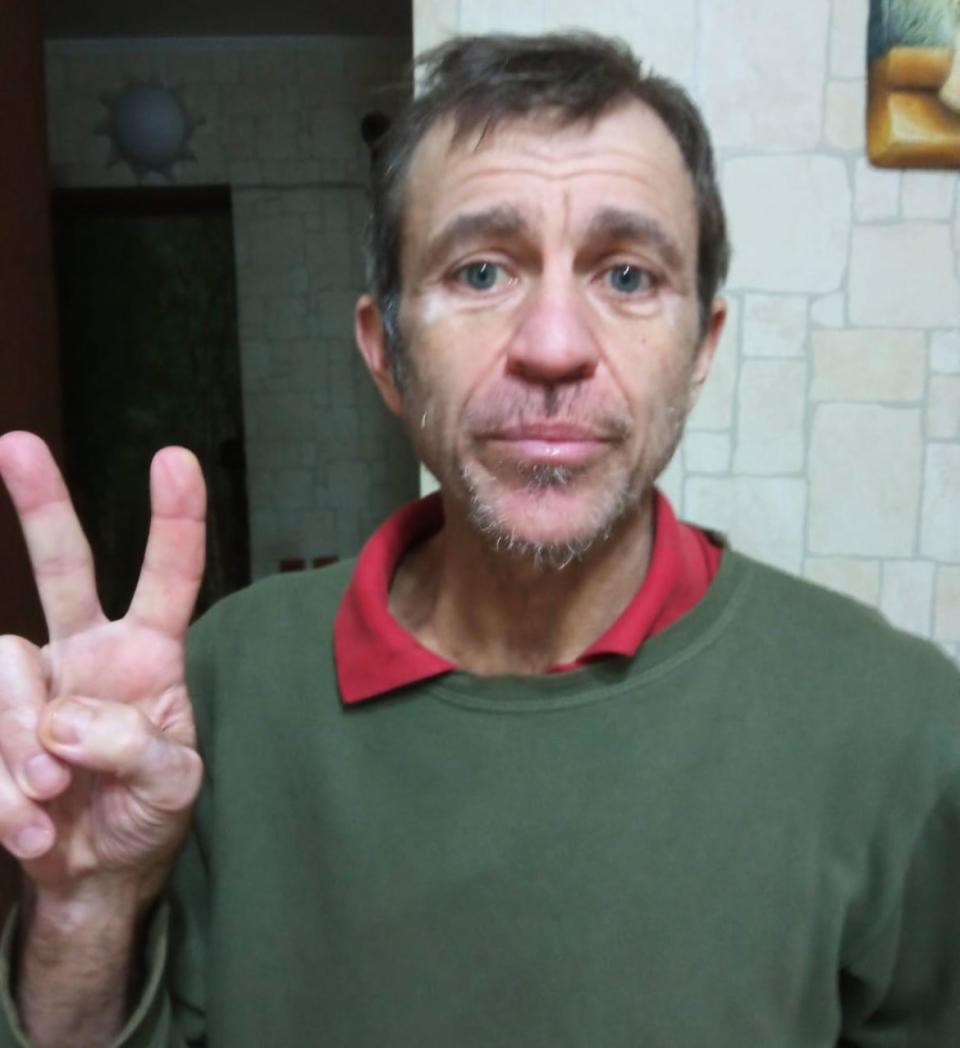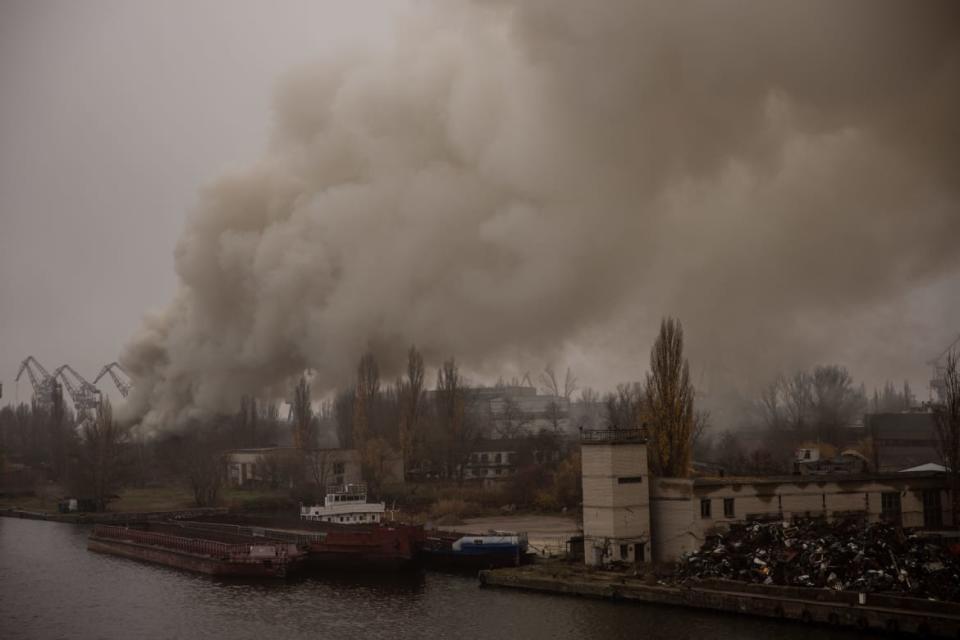Survivors: Russians Tortured Us With Twisted Sexual Abuse Technique Named After Biden

Kherson was the first major city to fall to Russian forces in the days after President Vladimir Putin’s invasion of Ukraine began. Few people had time to flee before the city fell to the Russians, including members of Kherson’s government, who remained trapped under occupation with a target on their backs.
Now, Kherson is once again a frontline town where attacks happen most days. With no new aid from the U.S. and a low supply of weapons, the authorities who remain fear the return of fighting on the streets, and the trauma of Russian occupation is constantly on their minds.
One man who asked to be referred to as “Ihor” told The Daily Beast that many people in Kherson resisted Russian soldiers by protests, working in underground networks, or sending information to Ukraine’s military when the city was occupied two years ago. Ihor and his wife had been attending anti-occupation protests for months and keeping up with Ukrainian news on their hidden cellphone.
During the summer of 2022, Ihor said his brother-in-law asked him to pass along any information he found about Russian collaborators, which he agreed to do. On Aug. 7, 2022, Russian soldiers pulled up to Ihor’s driveway in a large transportation van. He knew that he would be taken prisoner. Despite never being charged with a crime, Ihor was taken into custody and shunted around a series of prisons.
New Plot Striking the Heart of Russia Is Nightmare for Putin
He said the prison cells were “filled with mold” and so small that he and his eight fellow prisoners felt that they could not breathe. “There was no air, no water, no food, no medical aid,” he said. Ihor says he has a weak heart, and the conditions of the prison made things worse. “We were just using one bottle as a toilet with the other people with whom we were in the cell,” he said.
For the first 23 days of his incarceration, Ihor says he did not eat, and each night, the men in his cell took turns lying down to sleep. Ihor said that the Russians controlling the prison also sexually assaulted the men, inserting wires into their genitals and zapping them with a current. “They called this ‘Biden’s Call,’” he told The Daily Beast.
Another former prisoner of war, Andrii Andriuschenko, told The Daily Beast that he had also suffered “Biden’s Call,” which he described as the next step of torture after a method called “Zelensky’s Call,” where Russian soldiers wrap a cable from a field phone to a person’s ears or genitals and make a phone call, which sends a blast of electricity to the targeted area of the body. “The ‘Call to Biden’ is the second state, when a cable is inserted into the anus and a person is electrically shocked this way,” said Andriuschenko.
Kateryna Girniak, a communications officer at the U.N.’s Human Rights Monitoring Mission in Ukraine (HRMMU), told The Daily Beast that similar horrific assaults have been recorded as part of Russia’s arsenal of abuse during this conflict.
“HRMMU documented electric shocks as a form of torture in some instances, including by using a TA-57 military telephone (known as TAPik),” she said. “Electric shocks may be categorized as sexual violence in some instances, for example if… applied to genitals or breasts.”
Leading from Underground
Trapped alongside the citizens of the Kherson region were some of the politicians, leaders and mayors of towns that fell quickly under Russian control. Yurii Sobolevsky, the First Deputy Chairman of the Kherson Regional Council, said officials attempted to work until the last minute when they were pressured to collaborate with Russian soldiers, or labeled enemies of the Russian state. Many of them fled. Left behind were a few local officials, many of whom were arrested, and two years later, some are still prisoners of the Kremlin. A small group of authority figures stayed behind and shifted their work to focus on humanitarian aid.
“I couldn’t just leave all the people in this region. My phone was exploding with calls,” said Sobolevsky, who remained in Kherson for the first three months of the occupation.
Alongside other local authorities, Sobolevsky delivered humanitarian aid throughout occupied Kherson and neighboring Mykolaiv, which was also under occupation. At the time, the residents of Kherson were fighting back by holding protests and working underground to help Ukraine’s military, according to multiple sources who spoke to The Daily Beast.
Sobolevsky stayed in Kherson until he was labeled as a state criminal by the Russians and forced to flee—he was smuggled out of his home city. “I was afraid. The ones who say they are not afraid or such things are crazy or lying” he told The Daily Beast. “When I went to bed, I was still fully dressed because I knew I could be arrested at any moment. You realize that there is a risk of being killed, but you have to do your duty.”
Within the first few days of the war, Sobolevsky and other civilians in Kherson began to gather in masses to protest against occupation. They told Russian soldiers to “Go Home,” graffitied “Slava Ukraini” (“Glory to Ukraine”) on buildings and waved yellow and blue flags. Sobolevsky turned to a local tailor who once worked for Kherson’s local administration, Oleg Akimchenkov, to create yellow and blue ribbons that could be distributed to the people who attended the protests.

Oleg Akimchenkov in custody.
Akimchenkov had already created a defense network of fellow civilians who tried to minimize looting and petty crimes among local residents who were struggling under the duress of war. Russian soldiers got to know Akimchenkov from his defense network and his work as a Red Cross volunteer. For months, Akimchenkov and two other men traveled in a bulletproof van throughout both occupied and free Ukraine, passing through an average of 30 Russian checkpoints to deliver aid. However, what Russian soldiers did not know was that he was working with Ukraine, passing information about the occupier’s military positions, and smuggling people out of Kherson.
“We were taking journalists, volunteers, former soldiers who didn’t have time to leave, and the families of soldiers because repressions started; they were caught. We were [helping] everyone we could,” Akimchenkov told The Daily Beast.
Why Some Ukrainians Think Trump WILL Save Them From Putin
On a routine trip on Aug. 5, Akimchenkov said that he and one of the volunteers he traveled with were arrested by Russian soldiers, who imprisoned them for no apparent reason. Although they did not charge Akimchenkov with any crime, he was transported through multiple jails in occupied territories for months. Repeatedly throughout the initial interrogation process, Akimchenkov added that he and his fellow volunteer were beaten while Russian soldiers screamed at them “What did you do in Kherson?”
After hours of this treatment, they were thrown into a prison cell with nine other men, some of whom were aid workers, local administration workers, former soldiers, and civilians. For two months, Akimchenkov was moved around prisons in occupied territories, and despite repeatedly being tortured, he said he refused to give any information about his work or that of Ukrainians who were also helping their country’s military.
Akimchenkov and Ihor remained in Russian prisons until October 2022. By the time of their release, both men had lost a significant amount of weight and had deteriorating health. One month after they were freed—on Nov. 11—Kherson city was liberated.
When it was safe, Sobolevsky returned to work. Although the city has now been liberated for nearly 18 months, some of the towns and villages in the region are still under occupation, and currently, the southern frontline is just over three miles outside the city limits. Sobolevsky said that Kherson’s government is not planning for another occupation. “Over this last year and a half, we stay believing that our army is best and they will not let Russians occupy here again soon. There is nothing worse than being under occupation,” he said.

A fire burns after a Russian strike in the Kherson ship yards on Nov. 24, 2022. Kherson was the only regional capital to be captured by Russia following its invasion on Feb. 24.
Wild Accusations
Kherson’s government has tried to return to a pre-war normal, but it is missing one of its most influential people—mayor Ihor Kolykhayev, who has been a Russian prisoner since May 2022. His son Sviatoslav told The Daily Beast that he has received no information or proof of life since September 2023. Sviatoslav Kolykhayev has had to piece together what happened to his father from men who were in the same prison. He has heard accounts of Russians using psychological torture on his father.
“He was put in a single cell for more than 120 days without any human activity. Not a single point of contact from the outside world,” said Sviatoslav.
There have been accusations by some Ukrainians that Ihor Kolykhayev was a Russian collaborator, an allegation that his son strongly denies. Before his arrest, Kolykhayev had worked to distribute humanitarian aid to residents of Kherson. Sviatoslav and his mother were evacuated from Kherson during the occupation. He said his father “could have saved himself from it [imprisonment]” by fleeing with his family. But he was a person who was keeping his word. He was giving his word to his people,” that he would remain in Kherson despite threats to his life. Sviatoslav believes the Russians might have tried to recruit his father, and when Kolykhayev refused to collaborate, he was arrested. Sviatoslav has no proof of this.
Sviatoslav said that in September 2023, he was informed that his father was on an official prisoner exchange list created by Russian officials. Although he stressed that he has tried to contact Ukraine’s government multiple times to facilitate some agreement for his father’s return, his requests have been ignored.
“Why [in] the country where my father was living, why they [government] don’t protect him?” he said, adding that he constantly tries to move the prisoner exchange forward. “They don’t show any interest in contact with me and my family. They don’t show any interest in this situation,” he added.
The residents of Kherson know that if the Russians return to occupy the land, these tales of cruelty, mistreatment and torture will be heard all over again. For Ihor Kolykhayev, it might be too late, no one knows if he is in a Russian prison being tortured, or if he is dead.
Sviatoslav said he feels that some of the people protecting human rights in Ukraine do not get enough attention for their work. He believes that in Ukraine, people do not acknowledge the sacrifices his father has made, adding that he does not know what the next stage for his father’s prisoner exchange would be.
“I don’t see the real way to solve it. But I would use any opportunity to save his life now,” he said.
Get the Daily Beast's biggest scoops and scandals delivered right to your inbox. Sign up now.
Stay informed and gain unlimited access to the Daily Beast's unmatched reporting. Subscribe now.

 Yahoo News
Yahoo News 
